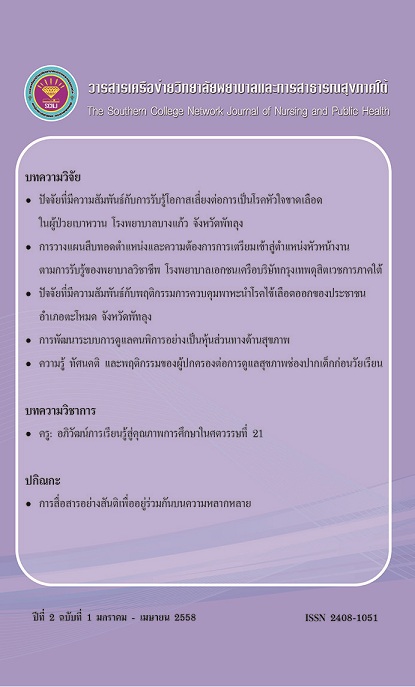การพัฒนาระบบการดูแลคนพิการอย่างเป็นหุ้นส่วนทางด้านสุขภาพ
คำสำคัญ:
คนพิการ, ระบบการดูแลคนพิการ, หุ้นส่วนทางด้านสุขภาพ, ระบบสุขภาพระดับอำเภอ, Care System for Disabled People, Health Partnerships, DHSบทคัดย่อ
การดูแลคนพิการในชุมชนต้องครอบคลุมทั้งการส่งเสริม ป้องกัน รักษา และฟื้นฟู รวมทั้งการจัดระบบการจัดการของแต่ละหน่วยงานที่มีหน้าที่เกี่ยวข้องให้ทำางานประสานกันเพื่อขับเคลื่อนการทำงานทั้งระบบ การศึกษาครั้งนี้เป็นวิจัยเชิงปฏิบัติการ (Action Research) มีวัตถุประสงค์ เพื่อพัฒนาระบบการดูแลคนพิการอย่างเป็นหุ้นส่วนทางด้านสุขภาพ ซึ่งศึกษากลุ่มคนพิการในอำเภอหนึ่ง โดยใช้แนวคิด Kemmis and McTaggart (2000) 4 ขั้นตอน คือ ขั้นวางแผน (Plan) ขั้นปฏิบัติการ (Act) ขั้นสังเกตการณ์ (Observation) ขั้นสะท้อนผลการปฏิบัติ (Reflect) กลุ่มประชากรที่ใช้ในการศึกษา คือ คนพิการทั้งหมดของอำเภอนาทวี จังหวัดสงขลา จำนวน 1,023 ราย ตั้งแต่ตุลาคม พ.ศ. 2555 ถึง กันยายน พ.ศ. 2556 เครื่องมือที่ใช้ในการศึกษา รูปแบบ District Health System (DHS) ซึ่งเป็นกระบวนการทำงานเพื่อร่วมแก้ไขปัญหาสาธารณสุข อย่างมีประสิทธิภาพ บูรณาการภาคีเน้นเป้าหมายผ่านกระบวนการชื่นชม และจัดการความรู้ แบบอิงบริบท ของแต่ละพื้นที่ โดยเน้นการเข้าถึงบริการของประชาชน การเข้าถึงบริการที่จำเป็น และการกระจายระบบบริการที่มีคุณภาพลงสู่ประชาชน กำหนดประเด็นสุขภาพในการพัฒนาร่วมกันใน “หนึ่งโครงการหนึ่งอำเภอ: ประเด็นคนพิการ” (One District One Project: ODOP) มีองค์ประกอบ 5 ด้าน (UCARE) คือ การทำงานร่วมกันในระดับอำเภอ การมีส่วนร่วมของเครือข่ายและชุมชน การทำงานจนเกิดคุณค่าทั้งกับผู้รับบริการและตัวผู้ให้บริการเอง การแบ่งปันทรัพยากรและการพัฒนาบุคลากร และการให้บริการสุขภาพตามบริบทที่จำเป็นการพัฒนาระบบการดูแลคนพิการ โดยชุมชนมีส่วนร่วมในการจัดบริการการฟื้นฟูสมรรถภาพ ให้คนพิการในชุมชนมีคุณภาพชีวิตที่ดี สามารถอยู่ในสังคมและชุมชนได้อย่างเสมอภาค มีศักดิ์ศรีเท่าเทียม คนทั่วไป แล้วยังเป็นการกระตุ้นและสร้างขวัญกำลังใจให้คนพิการรู้สึกถึงคุณค่าในตัวเอง ไม่ท้อแท้สิ้นหวัง ทั้งยังเป็นการสร้างความเข้มแข็งในชุมชน ให้ชุมชนสามารถดูแลคนพิการ เกิดการขับเคลื่อนงานคนพิการ เพื่อให้คนพิการได้มีโอกาสทำงาน หรือดำรงชีวิตในสังคมอย่างเต็มศักยภาพ
The Development of Care System for Disabled People with Participation of Community Health Partnerships
The main elements of an eventual developed care system for disabled people consist in a) health promotion, b) health prevention, c) treatment, and d) rehabilitation. The coordination of many institutions and key actors in the community is fundamental if we want to reach any significant results for the well-being of the disabled people. This action research aimed to improve the care organization for the disabled people with the participation of many local partners involved into community health care. The action research method theorized by Kemmis and Mc Taggart’s (2000) was applied. The study was divided into 4 steps: a) plan, b) action, c) observation and d) reflection on practice, and conducted from October 2012 to September 2013. Sample was 1,023 disabled persons who are currently living in Nathawee district, Songkhla province. The research instrument was based on the District Health System (DHS) model-- the working process for public health problem solving. The DHS consists in an integrated working process of the health local partners concerning the context of each area, and using the appreciation and the knowledge management concept. The finalities are public in terms of a) essential services access, b) equity into the distribution system and c) quality of service to all. Under the governmental provincial program “One District, One Product (ODOP)”, those elements for an eventual organized care system for the disabled was encouraged as a development in and for the community. The ODOP conjugate the 5 following factors, easy to remember under the acronym UCARE: Unity district health team, Community participation, Appreciation, Resource sharing and human development and Essential care. The disabled can live in community with equality and dignity. People with disabilities may have the opportunity to work or live in a society with full potential.
Downloads
เผยแพร่แล้ว
ฉบับ
บท
License
1. บทความหรือข้อคิดเห็นใด ๆ ที่ปรากฏในวารสารเครือข่าย วิทยาลัยพยาบาลและการสาธารณสุขภาคใต้ ที่เป็นวรรณกรรมของผู้เขียน บรรณาธิการหรือเครือข่ายวิทยาลัยพยาบาลและวิทยาลัยการสาธารณสุขภาคใต้ ไม่จำเป็นต้องเห็นด้วย
2. บทความที่ได้รับการตีพิมพ์ถือเป็นลิขสิทธิ์ของ วารสารเครือข่ายวิทยาลัยพยาบาลและการสาธารณสุขภาคใต้







